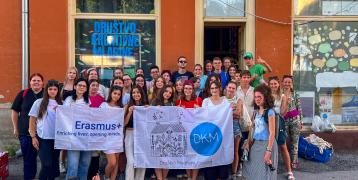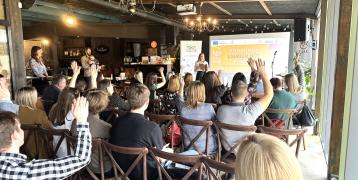Youth and employment: not just any job

Youth unemployment remains one of Europe’s most persistent and complex challenges. Despite improvements in labour market participation rates, over 14.5% of young people across the EU were unemployed as of February 2025, with 6 Member States exceeding 20% (source: Eurostat).
In parallel, the issue of NEETs – young people not in education, employment or training – continues to demand attention from policymakers and practitioners alike.
But the goal is not just to push young people into any job. What matters is helping them access meaningful employment – jobs that match their skills and aspirations, offer decent working conditions, and open pathways to personal and professional growth.
This calls for a diversified and proactive approach: one that supports skill development, offers hands-on work experience, fosters entrepreneurial ambition, and enables mobility.
Helping youth discover their potential
For many young people, especially those who are long-term unemployed or disconnected from education systems, the first step is not employment—it is confidence. Understanding one’s strengths, mapping vocational maturity, and setting realistic career goals are crucial steps toward meaningful integration.
The Youth in Transition Erasmus+ project created a Vocational Maturity Self-Assessment Tool tailored for NEETs aged 15 to 29. By guiding young people through six core parameters—from motivation to resilience—counsellors use the tool to spark constructive dialogue and co-design vocational pathways. Tested in Denmark, Iceland, Slovenia and Luxembourg, the tool proved its adaptability across different systems and cultures.
At a systemic level, Slovenia’s Statistically Assisted Profiling (StAP), also described by atWork4NEETs project, helps employment services to personalise support. By analysing data from 18 variables, StAP predicts each jobseeker’s likelihood of employment and recommends tailored activation measures.
For Public Employment Service counsellors, the tool has become a vital compass—especially during the COVID-19 pandemic, when face-to-face counselling was limited.
Youth counselling is complex, particularly when working with individuals who face multiple barriers or follow non-traditional paths. Tools like the Vocational Maturity Self-Assessment and StAP bring structure and clarity to this process.
They help professionals offer tailored, high-quality guidance even when supporting young people with complex needs or unconventional trajectories.
Empowering youth through safe spaces
Inclusion is more than access. It is about creating environments where young people feel seen, supported, and encouraged to grow. One effective entry point? Safe, youth-led spaces that blend community, creativity, and opportunity.
In Murska Sobota, Slovenia, the Living Room and Information Point for Young Creatives, described by the RuralYouthFuture future project, turned an empty building into a resource centre. This was more than a renovation - it became a revival. The centre now buzzes with activity: podcast recordings, therapeutic workshops, Erasmus+ info sessions, and intergenerational exchanges. It gives young people, particularly those with fewer opportunities, a stage to learn, share, and lead.
Also in Slovenia, the ALMA Initiative piloted a six-month mobility-based mentoring programme for NEETs. This programme was identified as a good practice by the atWork4NEETs project. After initial coaching and skill-building, participants engage in a 70-day work placement in another EU country.
Over 75% of participants reported improved communication and adaptability, and nearly half found employment within six months. It is a hands-on reminder that confidence can grow across borders.
Supporting mental health, building self-esteem, and creating inclusive spaces are critical to unlocking the potential of Europe’s youth. When young people feel safe and supported, they are far more likely to envision and pursue a future for themselves.
Entrepreneurship as a lever of labour market inclusion
For many young people, entrepreneurship is a practical strategy to stay, grow, and thrive locally, especially in rural areas where few employment opportunities are aligned with their ambitions. Several Interreg Europe projects have shown how structured support can ignite this potential.
In Latvia, the youth entrepreneurship programme “Laukiem Būt!” (The Countryside Will Be!), offers intensive training, one-on-one coaching, and a business plan competition with real financial awards. The RuralYouthFuture project identified it as a prime example of how well-designed local initiatives can nurture young people’s entrepreneurial ambition.
The results speak volumes: over 2,500 participants, and more than half of them have launched or continued their businesses.
For those drawn to the social economy, the RuralYouthFuture project identified the RuralLAB 3.0 project in Bulgaria which offers tools to foster social entrepreneurship among youth. Participants can assess their entrepreneurial competences, join virtual training environments, and even connect with potential funders through an interactive platform. With 93% of participants intending to use their new skills professionally, the approach is as empowering as it is practical.
Access to finance remains a key hurdle – for example in agriculture. The Slovenian AGRO FI MICRO microcredit scheme for young farmers shared by the Microfuture project addressed this challenge. With zero interest, no collateral required, and a digital application system, the initiative has already approved loans worth €1.27 million.
Key success factors to attract young people were simple and fast application procedures, workshops and one-to-one advisory services.
Investing in the Next Generation
The fight against youth unemployment is not a sprint. It is a complex marathon requiring systemic change, personal support, and creative thinking.
The good practices showcased across Interreg Europe projects underline a critical truth: when young people are met where they are, whether through mentoring, entrepreneurship, digital tools or peer networks, they respond with energy, ideas, and ambition.
What is more, these practices are ready to be transferred. Their low-cost, high-impact designs and strong community ties make them adaptable across Europe’s diverse territories.
For policymakers, youth workers, and educators alike, they serve as a clear reminder: youth unemployment can be addressed with the right tools and targeted support.




